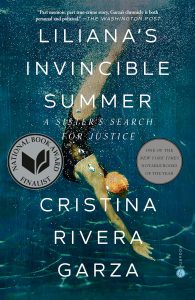Cristina Rivera Garza stands in a Mexico City police station, asking for the case file on her younger sister, Liliana, who was murdered thirty years earlier. The indifferent clerk tells her, “Do not believe for a minute that records live forever.”

Without this file, Rivera Garza fears Liliana’s “experience on earth will be as good as nothing, Her memory erased.” That moment, she says, “is when I realized that I must write, I must replace this file … this is the split second in which I understand how writing defies the state.”
The result is this sobering and multi-layered account of Liliana’s murder, likely by her jealous boyfriend, of the plague of femicides in Mexico, and of Rivera Garza’s search not only for justice, but for a sisterly understanding of who Liliana really was and why she was killed.
Rivera Garza, a prolific author and a professor at the University of Houston, achieved only a part of her quest. She never found the case file and the prime suspect, Ángel González Ramos, remains at large. She does, though, preserve Liliana’s life and frames her death in preceding years of abuse.
Using Liliana’s own words, found in letters and notebooks, and interviews with university friends, Rivera Garza follows her sister’s breadcrumbs from high school, when she first met the man accused of killing her, to when, at age 20, “femicide violence arrived one night at my sister’s house … placed a pillow over her face, and took her life.”
If there is a singular emotion that infuses “Liliana’s Invincible Summer,” it is anger. Rivera Garza creates streaming, rhythmic sentences that sizzle with such rage they beg to be read aloud – not just about Liliana’s death, but also about the values in her native country that consider a woman’s wife to be lesser than that of a man’s.
In Mexico, she writes, “Femicide is a hate crime, one committed against women because they are women. Ten of them take place in Mexico every single day, leaving a trail of heartbreak perceived by impunity and flanked by indignation.”
“Liliana’s Invincible Summer” is an amalgam – part Liliana’s writing, part reporting, part memoir. The latter two propel and deepen the story and the first (which I found to be overly extensive) provides the perspective of a young woman navigating a difficult and ultimately dangerous relationship. In combination, they create a powerful book.
